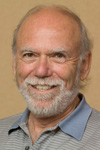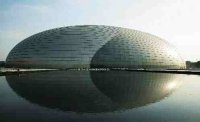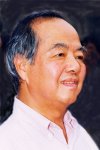Director's Corner
15 November 2007
 Barry Barish |
Chinese participation in ILC
 The symbol of the ILC workshop was the new Beijing National Grand Theatre: a cultural island in the middle of a lake near Tian An Men Square and the Forbidden City (Image courtesy of CCAST). The symbol of the ILC workshop was the new Beijing National Grand Theatre: a cultural island in the middle of a lake near Tian An Men Square and the Forbidden City (Image courtesy of CCAST). |
Beijing is a place to mark important ILC milestones. In 2004, the International Committee on Future Accelerators (ICFA) announced the decision to base the ILC acceleration technology on superconducting radiofrequency technology. In February 2007, we released the draft Global Design Effort Reference Design Report (RDR) for the ILC. This past week, in what I anticipate will mark an equally important milestone for the ILC, many of us attended the CCAST ILC Accelerator Workshop and first Asia ILC R&D Seminar under the JSPS Core-University Program. All three of these events took place in Beijing. This latter workshop featured both important high-level discussions with Chinese government officials as well as working level presentations and discussions about technical areas for Chinese involvement. I believe this combination will mark the beginning of an increasingly important Chinese role in ILC R&D and eventually in the project itself.
In 1986 under the support of the World Laboratory, the Chinese Academy of Sciences and the Chinese Government, Professor T.D. Lee of Columbia University established the Chinese Center for Advanced Science and Technology (CCAST), the sponsor of last week's workshop. The purpose of CCAST is to introduce important frontier areas of science to China, foster their growth by providing a suitable environment, and promote free exchange of scientific information between China and other nations.
Jie Gao of Beijing University and IHEP and Junji Urakawa of KEK were the chief organisers of this workshop. ILC leaders from the different regions of the world and the different technical areas of the project attended the workshop, which consisted of both informational presentations and informal discussions with the Chinese on potential areas of joint collaboration. The stated workshop aims were to: “review the progress of the ILC Asia regional accelerator related R&D activities in relation with other regions; promote regional and inter-regional collaboration on ILC; promote the active participations from individual countries to ILC; and draw more public attention to ILC collaboration, a super-scale adventure of humankind.”
As reported to us by Hesheng Chen, Director of IHEP, the BEPCII accelerator at their lab is in the final stages of commissioning and is making very good progress. The installation of the detector is also well underway. The general plan currently under discussion for ILC involvement is to transition some of the accelerator efforts toward the project as individuals become free from their BEBCII commitments. Both increased ILC accelerator and detector participation are anticipated, pending approval of ILC R&D funding. The accelerator experts will be immediately integrated into our engineering design effort and detector people will be able to participate in the emerging Letters of Intent effort. We do not anticipate a large involvement in the ILC, however, until there is a government commitment to the project, which is probably several years away.
We were also able to meet informally with Chinese officials. A number of officials participated in the opening session, where they heard both reports from the ILC Steering Committee and the Asian Committee for Future Accelerators (ACFA) on organisational matters. I presented an overview of the ILC project and future plans.
In addition, several of us were privileged to have dinner with a group of officials which included several high ranking member of the China Zhi Gong Party, one of eight democratic parties in China that is composed of Chinese who have returned from living abroad, their relatives, and noted figures and scholars who have overseas ties. Dr. Fu Xiaofeng, who is responsible for high energy physics at the Ministry of Sciences & Technology (MOST) also attended the dinner. He is very well informed about the ILC and more generally about high energy physics. We discussed a wide variety of topics including China's emerging role in science and technology, and specifically about their participation in the ILC. They were very supportive and encouraging with respect to developing government support for participation in the ILC.
-- Barry Barish
